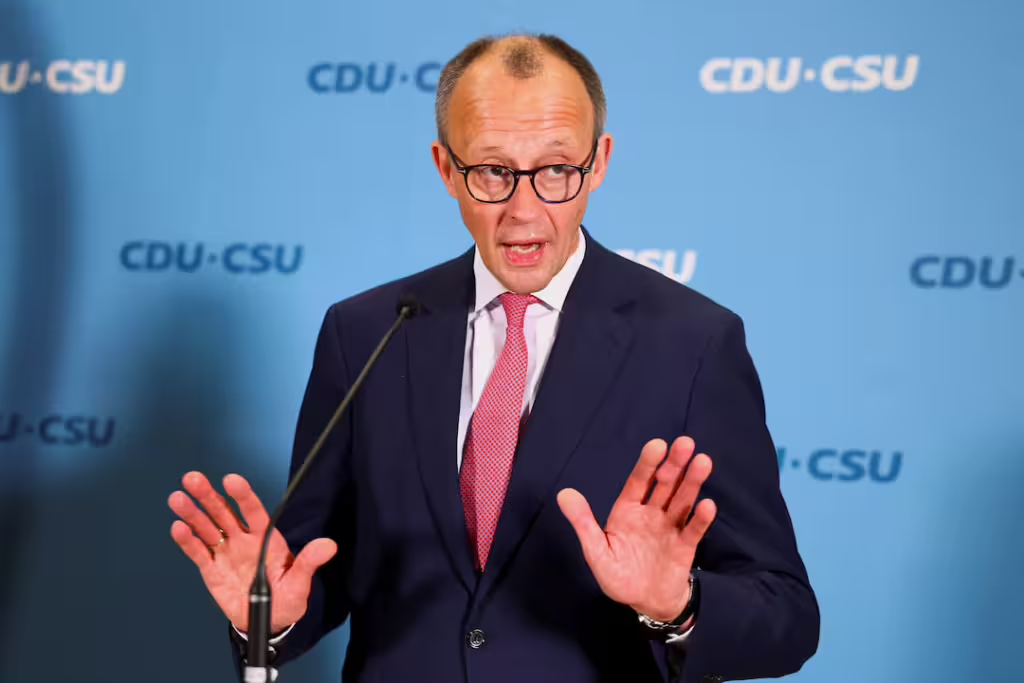Conservative leader Friedrich Merz, tipped to become Germany’s next chancellor, faces a challenging political landscape following his victory in the national elections. Despite success at the polls, forming a stable government will require delicate negotiations to form a coalition in a fragmented and polarized Parliament.
The victory of the conservatives, led by the Christian Democratic Union (CDU) and its Bavarian ally, the Christian Social Union (CSU), secured 28.6% of the vote, cementing Merz as the leading candidate for chancellor. However, the significant rise of the far-right Alternative for Germany (AfD), which garnered 20.8%—its best result ever—and the strengthening of the far-left Die Linke party, has resulted in a more polarized Parliament. Together, AfD and Die Linke now hold around a third of the seats, enough to block crucial constitutional changes, such as proposals to relax the debt brake—an existing constitutional limit on government borrowing.

This complex parliamentary makeup jeopardizes strategic economic plans. Economists warn that relaxing the debt brake is essential to stimulate economic growth and maintain the competitiveness of Europe’s largest economy, especially in a time of stagnation and global pressures. The failure to approve structural reforms could exacerbate existing economic problems, increasing unemployment and diminishing international investor confidence.
The most viable path for Merz to form a government appears to be an alliance with the Social Democrats (SPD), led by Olaf Scholz, who suffered their worst post-war election result, coming in third place. However, the deep ideological divides between conservatives and social democrats, particularly on sensitive issues like immigration, fiscal policies, and energy transition, make negotiations complex.
The SPD, resentful of the electoral outcome, may demand significant concessions in exchange for its support, raising the political cost of forming a coalition. Likely demands include robust investments in infrastructure, education, and social policies, as well as greater flexibility in fiscal targets. Merz, in turn, has already signaled some openness to discussing reforms to the debt brake, which could serve as a starting point in negotiations.
Jens Spahn, a senior CDU member, stressed the urgency of establishing a functional government, stating: “Initial talks must certainly take place this week. We are seeing the situation in the world, in Ukraine, Russia, the United States. German leadership is needed.”
Merz, who has no prior experience as chancellor, declared his intention to have a functioning government in place by Easter, highlighting the pressure for a swift resolution. Failure to form a coalition could lead to another election, deepening the political and economic instability in the country.
The election takes place at a delicate moment for Germany, which is facing significant geopolitical challenges. The country is divided on immigration policy, dealing with tensions between the United States and powers like Russia and China, and needs to redefine its role in European security. Both external and internal pressures are increasing expectations about the new government’s strategic positioning.
In his first post-election speech, Merz criticized “outrageous” comments from Washington during the campaign, comparing them to hostile Russian interference. He said: “The top priority will be to strengthen Europe as quickly as possible so that we can achieve true independence from the U.S., step by step.”
His stance signals a potential shift toward a more autonomous foreign policy, prioritizing European sovereignty over American influence. This strategy could include strengthening regional alliances within the European Union and promoting a more integrated defense policy among member states.
Although traditional parties have formally ruled out alliances with the AfD—monitored by Germany’s security services due to suspicions of extremism—the party’s growth increases its political weight. The AfD has been boosted by external support, including from billionaire Elon Musk, who praised the party’s anti-establishment stance.
The strong presence of the AfD and Die Linke in Parliament creates a blocking minority that could complicate crucial strategic decisions, such as increased defense spending and continued military aid to Ukraine—both of which are widely contested by these parties. This configuration could make the German Parliament less efficient, leading to frequent legislative gridlocks.
Meanwhile, Germany faces a latent economic crisis, with businesses calling for policies that enhance their global competitiveness. The immigration debate also remains polarized, with part of the population demanding stricter policies, while others advocate for more humanitarian approaches.
Germany’s industrial sector, historically one of the strongest in the world, suffers from high energy costs, a shortage of skilled labor, and an unstable supply chain still recovering from the pandemic. Furthermore, ambitious environmental policies, while crucial for addressing climate change, have raised concerns about their impact on traditional industrial sectors.
Merz’s challenge will be to balance these social and economic pressures, form a functional coalition, and preserve Germany’s political stability in an increasingly unstable global environment. His negotiation skills and leadership over the coming months will be critical not only for the country’s immediate future but also for its strategic position in Europe and the world.
Germany is the largest economy in the European Union and one of the bloc’s key political actors. The outcome of these elections has direct implications for the stability and cohesion of the EU. If Merz succeeds in forming a solid government, he could push forward policies aimed at greater European integration, particularly in areas like common defense, energy policy, and digitalization.
However, if internal challenges prove insurmountable, Germany risks adopting a more inward-looking approach, focusing on domestic crises and diminishing its influence on European and global issues.
The post-election political landscape in Germany is marked by uncertainties and substantial challenges.
Friedrich Merz will need to demonstrate political skill, strategic vision, and negotiation ability to lead the country through turbulent times. The coming weeks will be crucial in defining not only the future of the German government but also Germany’s role in the international arena in the coming years.

